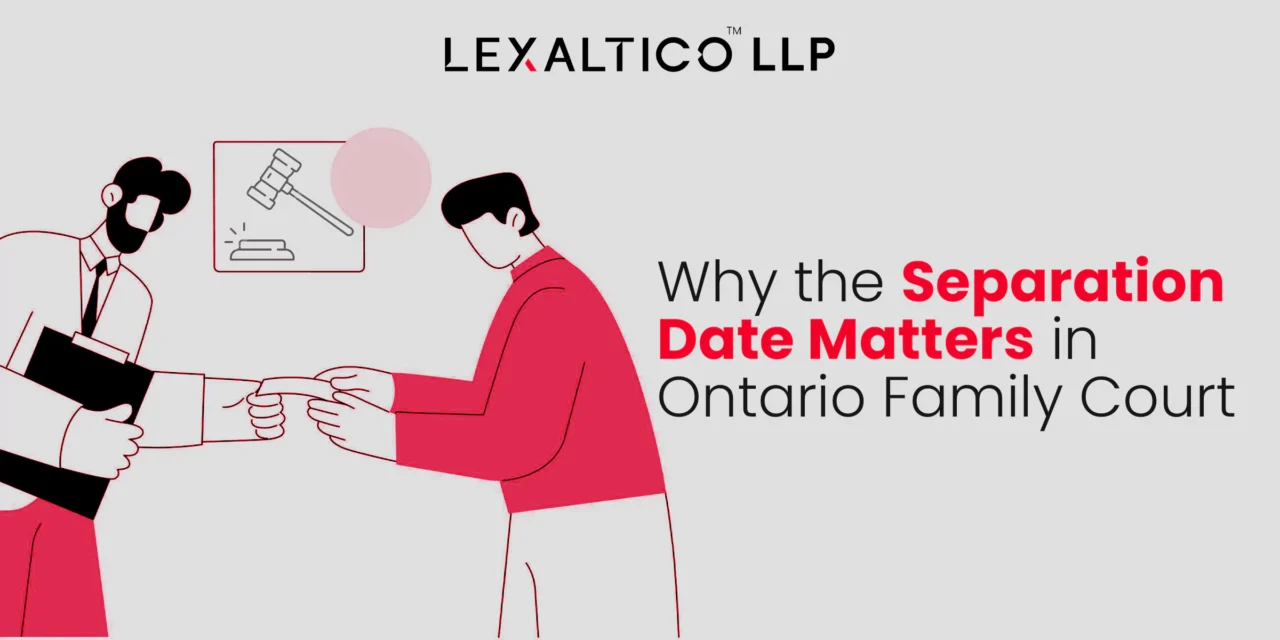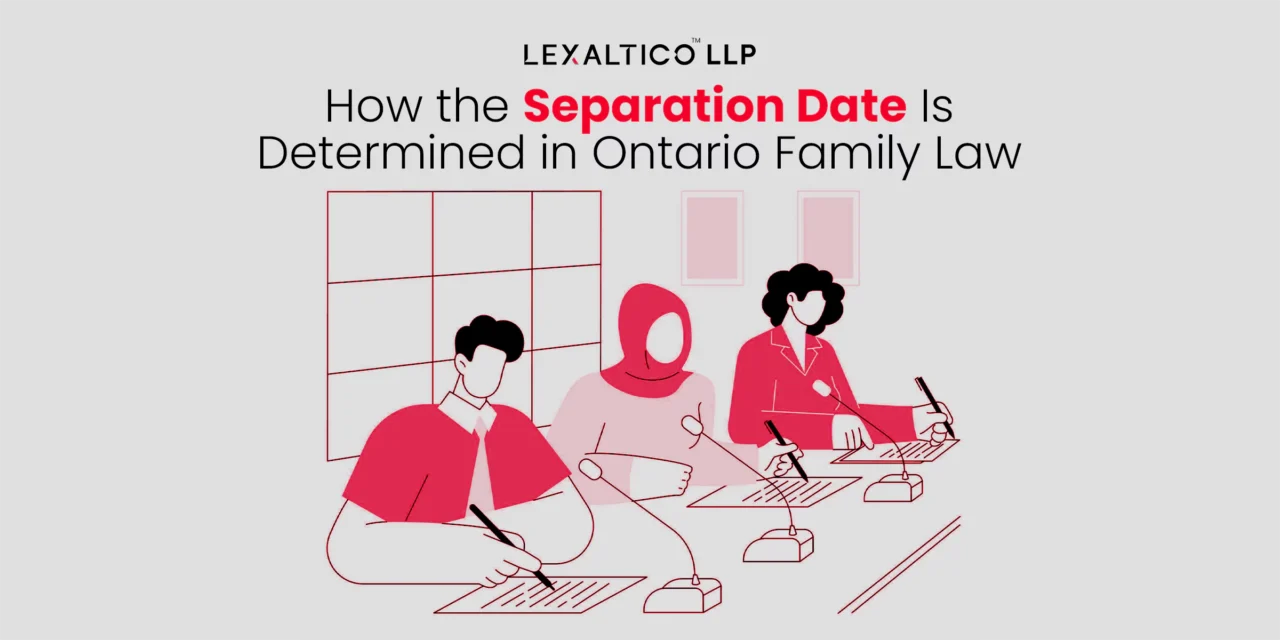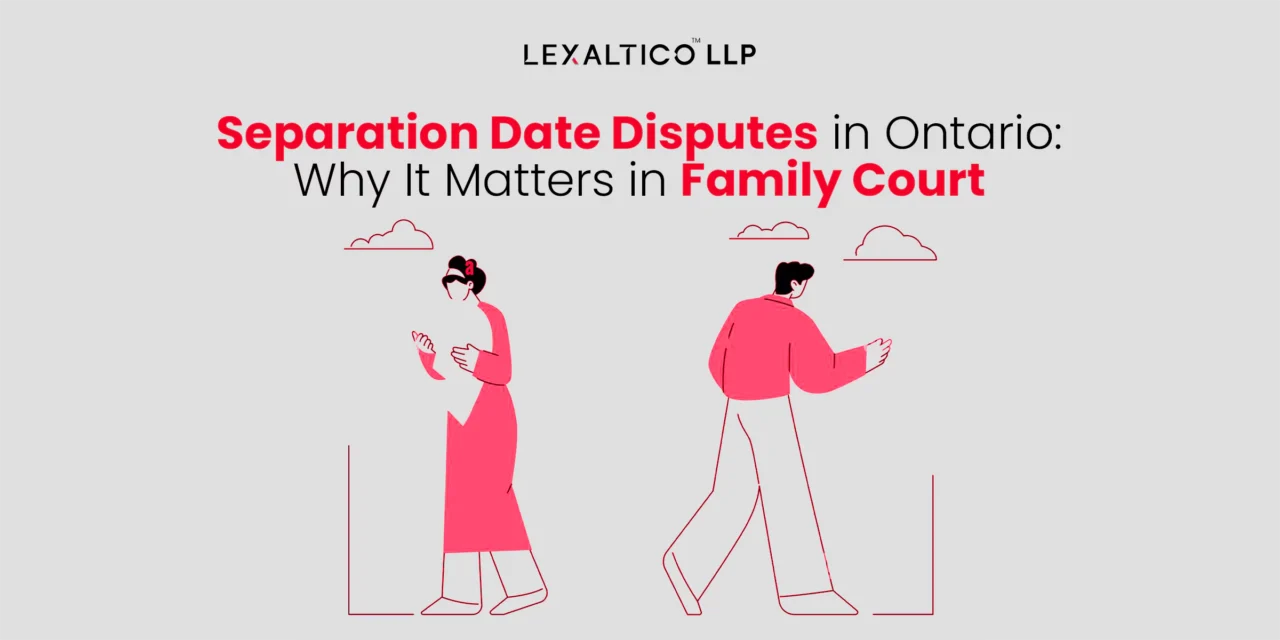Did you know that just over 275,000 family law cases were active in Canadian civil courts in 2019/2020?
Among these, a significant number were disputes over the separation date. A simple date plays an important role in family law matters, including property division, spousal support, and other related issues. For couples going through a divorce, this date can have major financial and legal implications.
In Ontario, separation date disputes are not uncommon. This is because the date a couple chooses (or is forced to choose) as their separation date can heavily affect the way courts handle property division, spousal support, and even child custody.
But why exactly is this date so important, and how can one figure out the separation date in Ontario family law? Let’s take a closer look.
Why the Separation Date Matters in Ontario Family Court

1. Property Division: The Equalization Principle
Ontario uses an equalization of net family property system: each spouse generally keeps the assets in their own name, and one spouse may owe the other an equalization payment based on each spouse’s net family property as of the valuation date (with special rules for the matrimonial home). The separation date acts as a cutoff point for deciding what property is divided and what remains separate.
Property is valued as of the valuation date (usually the separation date), so post-separation increases or decreases are generally not part of the equalization calculation. This is why a disputed separation date can significantly impact the division of property.
For example, if a home goes up in value after one spouse claims the separation date, it could be a major point of contention. Understanding the separation date ensures that both spouses receive a fair share of what they jointly built during the marriage.
2. Spousal Support and Financial Independence
The separation/valuation date fixes property calculations, but spousal support is a separate analysis under the Spousal Support Advisory Guidelines. Post-separation income can still affect support amount and duration, even though it doesn’t change property equalization.
When figuring out spousal support, a later separation date could mean a longer period for which one spouse might be entitled to support. On the other hand, a spouse who argues for an earlier separation date might be able to reduce their spousal support obligations. Therefore, this date isn’t just about timing. It’s about fairness in the financial arrangements between the spouses.
3. Limitation Periods and Legal Deadlines
Ontario sets equalization deadlines at the earlier of: six years after separation, two years after a divorce judgment, or six months after a spouse’s death. If the separation date is not properly set or disputed, it could result in the loss of rights to pursue property division or spousal support claims.
How the Separation Date Is Determined in Ontario Family Law

1. Moving Out and Ceasing to Act as a Couple
For many couples, the separation date is easy to figure out when one spouse moves out of the shared home. However, the date can be more complicated when couples continue to live together after deciding to separate.
In Ontario, you don’t necessarily have to live apart for the separation to be valid. The law recognizes couples who live separate and apart under the same roof as long as they stop acting as a couple in all respects.
Example: if spouses stop sharing a bedroom, stop engaging in marital activities like intimacy, and begin living as roommates rather than partners, they may have separated even if they’re still physically living together.
This is where things can get tricky. The courts look for clear evidence of living separate and apart, which includes things like separate finances, no public socialization as a couple, and other changes in their relationship.
2. Marriage Counseling: Can It Delay the Separation Date?
In some cases, couples may attend marriage counseling in an effort to reconcile. This can create a scenario where the separation date is unclear. In a case like Cheng v. Sze, the court stressed that separation is a process rather than an event, and fixed a separation/valuation date based on the parties’ conduct (choosing a date neither side proposed, when counseling had ended).
Courts are clear that for a separation to be valid, both spouses must have no reasonable expectation of reconciliation. A mere desire by one spouse to reconcile doesn’t change the separation date if the other party has already given up on the relationship. This is key in cases where one spouse might hope for reconciliation, but the other has moved on emotionally and financially.
3. Social and Financial Separation: What the Courts Look For
Courts ask when there was no reasonable prospect of resuming cohabitation. In Al-Sajee v. Tawfic (2019 ONSC 3857), the court listed contextual factors (financial separation, sleeping arrangements, public presentation as a couple, communications, etc.) and emphasized that no single factor is decisive.
If the spouses have stopped functioning as a married couple and are clearly living separate lives, the separation date may be recognized as the point when this was evident.
For instance, separating finances, such as opening individual bank accounts or transferring ownership of joint property, can strongly indicate a break in the relationship. This can be a determining factor in cases where there’s a dispute over when the separation occurred.
Disputes Over the Separation Date: A Real-Life Case
In Pennington v. Pennington (2022 ONSC 1631), the court held that documents like a ‘separation agreement’ or CRA forms were not determinative; weighing the parties’ conduct, it fixed a later separation date than the wife asserted
This case highlights the complexity of separation date disputes and shows how important it is to consider the totality of the couple’s conduct over time.
Tips to Avoid Disputes Over the Separation Date
- Document Everything: If you’re unsure when the separation happened, keeping a record of important events is crucial. Emails, texts, financial records, and testimony from friends or family can all help your case.
- Seek Legal Advice: A family lawyer can help you understand the legalities of setting your separation date and make sure you’re following the right steps.
- Be Honest: The separation date is important for the legal and financial outcomes of your divorce. Trying to manipulate the date for financial gain could backfire, as courts are very thorough in their investigation of facts.
Conclusion
The separation date is far more than a simple detail in Ontario family law. It impacts property division, spousal support, and the validity of your legal claims. Whether you’ve separated under the same roof or you’ve both moved out, this date marks the end of the financial and legal partnership that once existed. For couples facing separation or divorce, getting this date right is essential.
By understanding the legal significance of the separation date and the factors that courts consider, you can better handle the complexities of family law in Ontario. If you’re in doubt, seeking legal advice and documenting key events will help ensure that your separation date is set correctly and fairly.
Frequently Asked Questions
The date of separation in Ontario marks when spouses decide to live separately and apart, ending their marital relationship. It is the point when at least one spouse intends to no longer cohabit as a couple.
Hope for reconciliation alone does not affect the separation date if both spouses have agreed that the relationship has ended. The court focuses on the actions and intentions of both parties, rather than one spouse’s desire to reconcile.
To obtain a divorce based on separation, you must show that the marriage has broken down, most commonly by living separate and apart for at least one year before the divorce is granted. You can file earlier, and divorces can also proceed on adultery or cruelty without waiting a year.
Attempting to manipulate the separation date for financial gain can backfire, as the court reviews all evidence and intentions. Courts look for genuine actions and behavior rather than formal declarations to prevent unfair advantage.
There is no official form to confirm the separation date, but spouses may include it in a separation agreement or provide supporting documentation like tax forms. Courts may also rely on evidence from communication and financial records to establish the date.
If spouses disagree on their separation date, the court will examine evidence such as communication, finances, and living arrangements to decide the accurate date. Both parties may present their case, and the court considers the entire relationship context.
If spouses continue to live together but act as roommates, the court will look at other factors like separate finances, no marital intimacy, and their behavior to establish the separation date. The key is that they must stop functioning as a couple.
The separation date affects property division, spousal support, and other legal claims like child custody and support. It also determines the limitation periods for filing family law claims.
Disclaimer: The information provided in this blog is for general informational purposes only. It is not legal advice and should not be relied on as such.



